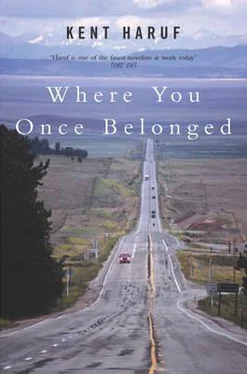Kent Haruf - Where You Once Belonged
Здесь есть возможность читать онлайн «Kent Haruf - Where You Once Belonged» весь текст электронной книги совершенно бесплатно (целиком полную версию без сокращений). В некоторых случаях можно слушать аудио, скачать через торрент в формате fb2 и присутствует краткое содержание. Год выпуска: 2004, Издательство: Pan MacMillan, Жанр: Современная проза, на английском языке. Описание произведения, (предисловие) а так же отзывы посетителей доступны на портале библиотеки ЛибКат.
- Название:Where You Once Belonged
- Автор:
- Издательство:Pan MacMillan
- Жанр:
- Год:2004
- ISBN:нет данных
- Рейтинг книги:5 / 5. Голосов: 1
-
Избранное:Добавить в избранное
- Отзывы:
-
Ваша оценка:
- 100
- 1
- 2
- 3
- 4
- 5
Where You Once Belonged: краткое содержание, описание и аннотация
Предлагаем к чтению аннотацию, описание, краткое содержание или предисловие (зависит от того, что написал сам автор книги «Where You Once Belonged»). Если вы не нашли необходимую информацию о книге — напишите в комментариях, мы постараемся отыскать её.
Where You Once Belonged — читать онлайн бесплатно полную книгу (весь текст) целиком
Ниже представлен текст книги, разбитый по страницам. Система сохранения места последней прочитанной страницы, позволяет с удобством читать онлайн бесплатно книгу «Where You Once Belonged», без необходимости каждый раз заново искать на чём Вы остановились. Поставьте закладку, и сможете в любой момент перейти на страницу, на которой закончили чтение.
Интервал:
Закладка:
So in April that year Jack Burdette arrived at the Holiday Inn. He was a big man and jovial, and he was ten years her senior and he was from Colorado. And so he charmed her. And then, rather than return to any more convention workshops, he proposed marriage to her. And, for her own reasons, she accepted. But there was one other little bit of play in this weekend romance too: sometime during those days and nights in the motel room Burdette managed to convey the impression to her that Holt was better than it is. He told her, for example, that you could see the mountains from Holt.
You can’t of course. You have to drive at least forty miles west of here to see the mountains. And then it has to be a very clear day, coming after it has rained or after the wind has blown hard for five or six hours so that the brown cloud hanging over Denver has been driven away or been blown off, and then what you see of mountains is merely a faint blue jagged line on the horizon some hundred miles farther to the west. But to Jessie Burdette, as later she would describe the manner in which Jack had told her about it, Holt County would at least have seemed different from Tulsa, Oklahoma. And she thought she had good reason to want out of Tulsa, Oklahoma.
She was the oldest of three children. The two others were boys, younger than she by five and six years. Her mother was an invalid, confined to a wheelchair, and her father was an implement salesman who was gone from home most of the time. As a teenager then, after her mother was crippled, she had spent many hours taking care of her mother and her two little brothers. She knew a great deal about cooking and cleaning and washing clothes and changing bedpans and emptying urine bags, and she had worked part-time in the evenings at fast-food restaurants, and she had even saved a little money to buy material to make clothes for herself. But she didn’t know much about fun. It was all a kind of gray reiteration of things to her, an endless unhappy routine. Then she graduated from high school. And after graduation she had worked as a temporary secretary on several occasions. But none of that was taking her anywhere. Then it was about this time that her father, because of business associations, heard about the weekend job at the elevator convention at the Holiday Inn. So she applied for the job and she was hired to show the film about hybrid seed corn in the motel lobby. She wore the miniskirt they required her to wear and the short-sleeved white blouse with the low neckline, and all the time she managed to smile congenially at the men at the convention. Then Jack Burdette showed up and began to talk to her. And soon it was more than just talk, and then on Monday he married her.
So for the next five years, after seeing her for the first time in the Holt Cafe that Thursday noon, like everyone else in town I still only saw her infrequently. And then it was only causally, remotely, as from a safe and necessary distance. On those occasions when she happened to be shopping on Main Street, or on those rare weekend nights when she would agree to go out to the bars with Burdette, I would see her, just as everyone else did, and pay attention to her.
She was still doing some of that then — going out to the bars, I mean. During those first seven or eight months after Wanda Jo Evans had left town and while she herself was still new among us, we would see her every once in a while at the Legion or at the Holt Tavern on Saturday nights. And we would all watch her then. Typically, she would be sitting quietly in a corner booth by herself, sipping some sugary drink very slowly while the ice in her glass melted away, thinning the pink liquor to mere colored water, while Burdette himself (since marriage hadn’t changed him; since marriage was merely a change in his weekend companion, not a real break in his Saturday night routine, that masculine habit and custom of his) would be standing off at the end of the bar away from her, drinking whiskey or scotch, the center of that constant and admiring group of backslapping men, while he told his jokes and stories and they all laughed.
That wasn’t often, though; we didn’t see much of that. Jessie Burdette did not go out to the bars very regularly. And when she did go out she was always pleasant and would talk to you if you said something to her, but she would never volunteer anything herself. Instead she seemed to prefer to sit quietly sipping her watery drink, watching others have what she maybe didn’t even consider then as being a very good time.
But in the meantime the local women had begun to work on her, to pay special attention to her. I suppose the women in town wanted to be friendly. They began to ask her to join their social clubs and their church organizations. Wouldn’t she like to come to tea, to join Rebecca Circle, to play bridge, to be a member of the Legion Auxiliary, to golf with them on Saturday mornings, or maybe — wouldn’t she like to participate in Bible study?
But she wouldn’t, she told the women. She refused them outright, although when they called on her she was pleasant about it all. Nonetheless she was certain about it too.
So the women felt a little hurt by this, a little bit rebuffed and rejected. It put them off. But a month or two later they decided to ask her again. She only needed more time, they told one another; she was merely being polite. She probably wanted to settle in more thoroughly and to look about her, as anyone would, moving to a new town. With the passage of time, she would feel differently, they said. In the middle of fall that first year they began to ask her again.
But again she refused their invitations, rejecting that female attempt at communal neighborliness and sociability a second time. She hadn’t changed her mind at all, it turned out. While we understood that she was still quite cordial to them, in that typical, quiet and pleasant manner of hers, she was also absolutely certain about it. She was not in the least bit interested.
And now the women felt more than a little put off. They were offended. They felt wounded by her rejection. As a result, they stopped asking Jessie Burdette to join anything at all.
* * *
Then in March of 1973, almost two years after she had arrived in town, she had a baby. She delivered a little boy whom she named Thomas John. Later, when that became too much of a mouthful, she shortened it to TJ. He was a handsome little boy. He had his mother’s dark hair and her sober brown watchful eyes. And it was obvious to us, seeing them on Main Street, what she thought of him. She was delighted with him. We would see them together: the young woman, small and quiet and trim again after her pregnancy, pushing the handsome little boy along the street in a baby carriage, the two of them going in and out of the stores, looking as content with themselves as if nothing else mattered. She would be smiling at him too, talking to him quietly as though he could already understand what she was saying. Then later when he was a little older and when it was summertime we began to see them in front of the house on Gum Street (for Burdette had made a small down payment on a two-bedroom house by that time; it was in the middle of town, near the railroad tracks) — this new mother and her little boy would be playing together on a blanket spread out on the grass in the shade under the elm and hackberry trees. He was a little more than a year old when she delivered a second child.
This one was a boy too, named Robert and called Bobby, who was almost the exact twin of his older brother: a handsome little boy with the same brown hair and the same brown watchful eyes. She was pleased with him as well. She was delighted with both of her sons.
Consequently there were three of them now for us to watch in town. Three of them to notice on Main Street or to observe in the yard in front of the house, playing games on the front lawn or making little farmsteads in the dirt with miniature cows and horses and bits of sticks — this young woman whom nobody knew at all yet, whom we had expected in the beginning to be some playgirl, some Oklahoma Monroe or Mansfield with a heaving bust and a cinched-in waist above wide hips and long legs, but who, it happened, wasn’t like that at all.
Читать дальшеИнтервал:
Закладка:
Похожие книги на «Where You Once Belonged»
Представляем Вашему вниманию похожие книги на «Where You Once Belonged» списком для выбора. Мы отобрали схожую по названию и смыслу литературу в надежде предоставить читателям больше вариантов отыскать новые, интересные, ещё непрочитанные произведения.
Обсуждение, отзывы о книге «Where You Once Belonged» и просто собственные мнения читателей. Оставьте ваши комментарии, напишите, что Вы думаете о произведении, его смысле или главных героях. Укажите что конкретно понравилось, а что нет, и почему Вы так считаете.












